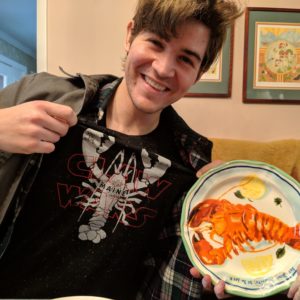Meet Taylor Bird, Lead Consultant, Data Scientist, and Xpert candidate at Excella. We sat down with Taylor to discuss his love for gaming, getting started in Data Science, and more.
It’s been amazing to watch your journey from software development into the world of AI and machine learning at Excella. What is the most recent thing you’ve been learning about that you’d like to share?
Learning about AI and machine learning (ML) has been exciting because we’re at a point in time where machine learning technologies are more available for everyone to learn about and use. It has been amazing to have the support of my mentors and colleagues here at Excella as I switched from development to data science during my 8-year tenure at Excella.
My latest interest has been functional programming, a style of programming that focuses on constructing programs using pure functions, which eliminates side effects. The Functional Paradigm offers a lot of opportunities to write code more intuitively and reduce programming errors. Our teams can solve problems with data that seemed unsolvable before. It also helps parts of a program run in parallel safely, which is becoming increasingly important as distributed computing is the only way that we’re able to move forward with some of the changes in technology that we’ve seen in the past 10 to 15 years.

Growing into a new role can be intimidating for anyone looking to make a big leap. What advice would you give others looking to expand their capabilities in Data Science?
My biggest advice to those looking to make that leap is to seek out a mentor and find a community to support you along your journey. As I was first gaining interest in the Data Science field, I went out on my own to expand my understanding of this capability, using courses and other resources that were available. But imposter syndrome is real. AI is an umbrella for an even larger collection of concepts than software development, and each concept covers a lot of density. Math, specifically linear algebra and statistics, were things that in my more discouraged moments I imagined would hold me back from ever being more than just an enthusiast. However, Excella has amazing mentors and an amazing community of data scientists who were willing to create a safe space and be vulnerable right along with me.
It turns out that the principles behind data science and machine learning are closer to overall software engineering principles than one might think at first and there is a zero-entry option. You don’t have to try to invent a brand-new algorithm from scratch to get started. Information about how to do AI/ML has been heavily democratized at this point and the community is full of support. There are also always cool things to learn in the news about advancements in our use of the nascent field in many areas. My first love, video game development, has its fair share of applications, but it doesn’t stop there. Whether it is for Physics, Art, Medicine, Robotics, or Archaeology, applications are starting to improve the way we do things at an unprecedented rate. So, reach out and find that community. It makes a difference.
Before Data Science, you were a software developer. How did you get started there?
I didn’t start off interested in software development and programming. As a child, I saw art, music, and storytelling as the way for me to be a part of what I loved—video games. I remember early on playing Donkey Kong Country and imagining how I could create a more immersive experience by adding more dynamic secret areas. It wasn’t until High School that I realized how creative coding could be after taking a few computer science courses, but I still viewed myself as an aspiring artist or musician.
During college, I found myself interested in computer science again because of the object-oriented paradigm. I realized that I’d found something new that I could be creative in. Besides being the foundation of interactive media like gaming, programming feels in many ways like the 20th Centuries’ star medium of creative expression. You can make virtually anything you can think of, and programs can be interactive or imbued with a special purpose. I came to the idea of being a lifelong programmer with a new purpose, and I kept having renaissances of that same kind throughout college and into my professional life.

What is your favorite game right now?
Probably Hollow Knight. I’ve been playing back through indie 2D platformers and Metroidvanias, and it stuck out to me. Everything in the game reinforces its theme; it has impressive art and a strong, yet simple set of mechanics.
What should people in your industry know as we close out 2022?
I believe that AI and machine learning are going to increasingly become part of a software developer’s job. While we still need explicitly programmed logic in our code, a hybridized approach is more effective than silos and black boxes. I encourage honeycombing even a little bit and trying to implement something simple, just to see if it is your cup of tea.
In general, I think it’d be great to see more blending between the disciplines of software and machine learning overall. Right now, these roles exist and work together on projects, but the more we can understand how the two disciplines interact and how they can complement each other, the stronger teams and organizations will be.
Why did you choose Excella and what made you stay here?
When I first joined Excella in 2014, I was looking for an environment where professional development and growth were a central focus. As I’ve grown my career here, the community of supportive mentors and colleagues has been a strong reason why I’ve stayed and is one of my favorite parts of Excella.
Our community is full of dedicated professionals looking to solve difficult problems, support each other, and make an impact with their customers.
Keep up with our innovator and follow his GitHub @nsubordin81.